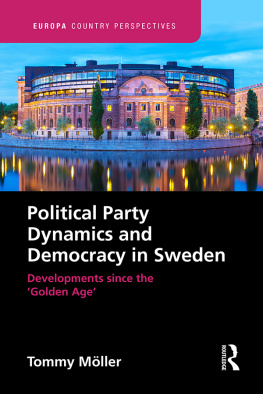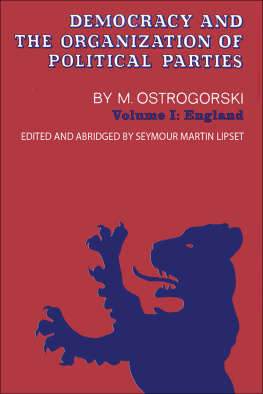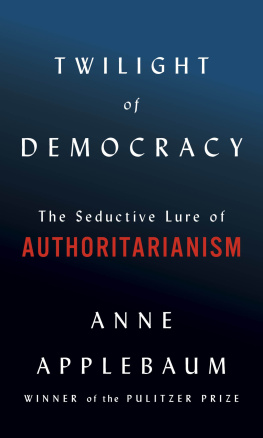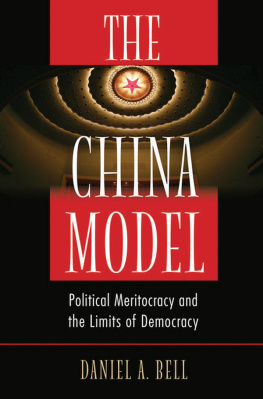Conservative Parties and the Birth of Democracy
How do democracies form and what makes them die? Daniel Ziblatt revisits this timely and classic question in a wide-ranging historical narrative that traces the evolution of modern political democracy in Europe from its modest beginnings in 1830s Britain to Adolf Hitlers 1933 seizure of power in Weimar Germany. Based on rich historical and quantitative evidence, the book offers a major reinterpretation of European history and the question of how stable political democracy is achieved. The barriers to inclusive political rule, Ziblatt finds, were not inevitably overcome by unstoppable tides of socioeconomic change, a simple triumph of a growing middle class, or even by working class collective action. Instead, political democracys fate surprisingly hinged on how conservative political parties the historical defenders of power, wealth, and privilege recast themselves and coped with the rise of their own radical right. With striking modern parallels, the book has vital implications for todays new and old democracies under siege.
Daniel Ziblatt is Professor of Government at Harvard University where he is also a resident fellow of the Minda de Gunzburg Center for European Studies. He is also currently Fernand Braudel Senior Fellow at the European University Institute. His first book, Structuring the State: The Formation of Italy and Germany and the Puzzle of Federalism (2006) received several prizes from the American Political Science Association. He has written extensively on the emergence of democracy in European political history, publishing in journals such as American Political Science Review , Journal of Economic History , and World Politics . Ziblatt has held visiting fellowships and professorships at Sciences Po (Paris), the Max Planck Institute for the Study of Societies (Cologne, Germany), Stanford University, the Radcliffe Institute (Harvard), and the Center for Advanced Studies (Munich, Germany).
Cambridge Studies in Comparative Politics
General Editor
Margaret Levi University of Washington, Seattle
Assistant General Editors
Kathleen Thelen Massachusetts Institute of Technology
Erik Wibbels Duke University
Associate Editors
Robert H. Bates Harvard University
Stephen Hanson University of Washington, Seattle
Torben Iversen Harvard University
Stathis Kalyvas Yale University
Peter Lange Duke University
Helen Milner Princeton University
Frances Rosenbluth Yale University
Susan Stokes Yale University
Sidney Tarrow Cornell University
Other Books in the Series
Christopher Adolph , Bankers, Bureaucrats, and Central Bank Politics: The Myth of Neutrality
Michael Albertus , Autocracy and Redistribution: The Politics of Land Reform
Ben W. Ansell , From the Ballot to the Blackboard: The Redistributive Political Economy of Education
Ben W. Ansell and David J. Samuels , Inequality and Democratization: An Elite-Competition Approach
Leonardo R. Arriola , Multi-Ethnic Coalitions in Africa: Business Financing of Opposition Election Campaigns
David Austen-Smith , Jeffry A. Frieden , Miriam A. Golden , Karl Ove Moene , and Adam Przeworski , eds., Selected Works of Michael Wallerstein: The Political Economy of Inequality, Unions, and Social Democracy
Andy Baker , The Market and the Masses in Latin America: Policy Reform and Consumption in Liberalizing Economies
Continued
Conservative Parties and the Birth of Democracy
Daniel Ziblatt
Harvard University
University Printing House, Cambridge CB2 8BS, United Kingdom
One Liberty Plaza, 20th Floor, New York, NY 10006, USA
477 Williamstown Road, Port Melbourne, VIC 3207, Australia
4843/24, 2nd Floor, Ansari Road, Daryaganj, Delhi 110002, India
79 Anson Road, #0604/06, Singapore 079906
Cambridge University Press is part of the University of Cambridge.
It furthers the Universitys mission by disseminating knowledge in the pursuit of education, learning, and research at the highest international levels of excellence.
www.cambridge.org
Information on this title: www.cambridge.org/9781107001626
DOI: 10.1017/9781139030335
Daniel Ziblatt 2017
This publication is in copyright. Subject to statutory exception and to the provisions of relevant collective licensing agreements, no reproduction of any part may take place without the written permission of Cambridge University Press.
First published 2017
Printed in the United States of America by Sheridan Books, Inc.
A catalogue record for this publication is available from the British Library .
Library of Congress Cataloging-in-Publication Data
Names: Ziblatt, Daniel, 1972 author.
Title: Conservative parties and the birth of democracy / Daniel Ziblatt.
Description: New York, NY : Cambridge University Press, 2017. | Series: Cambridge studies
in comparative politics
Identifiers: LCCN 2016056471 | ISBN 9781107001626 (hardback)
Subjects: LCSH: Political parties Europe. | Conservatism Europe. | Democracy Europe. |
Europe Politics and government. | BISAC: POLITICAL SCIENCE / General.
Classification: LCC JN94.A979 Z54 2017 | DDC 320.94DC23
LC record available at https://lccn.loc.gov/2016056471
ISBN 978-1-107-00162-6 Hardback
ISBN 978-0-521-17299-8 Paperback
Cambridge University Press has no responsibility for the persistence or accuracy of URLs for external or third-party internet websites referred to in this publication and does not guarantee that any content on such websites is, or will remain, accurate or appropriate.
Contents
Figures
Tables
Preface
There is often a moment when a scholars perspective is shocked into a new awareness of the problem he is working on. That moment struck me when I found myself on a detour from the basement archives of Hatfield House, a grand Jacobean-era home in Hertfordshire. I wandered down a long hallway with marble floors and high ceilings, the walls lined with oversized oil portraits depicting four centuries of ancestors. These were the Cecils, who had helped rule England since at least the reign of Queen Elizabeth I. There, standing amid the trappings of immense social power, I asked myself: How did the historical owners of this home and others like them, who had so much to lose and so much power at their disposal, ever come to terms with political democracy without fatally preventing its birth in the first place?
This question has absorbed me ever since. I became convinced that if I could answer it if I could understand how and why powerful old-regime elites hand over political power with so much at stake then I could begin to unscramble a great historical puzzle that bears far-reaching implications: how European societies themselves democratized over the course of the nineteenth and twentieth centuries. I have sifted through a century of archival and quantitative historical evidence in two countries, Germany and Britain, and analyzed the histories of a wide range of other European countries. Along the way, I have discovered the narrative of one of the most critical political phenomena in the contemporary world: how political institutions of accountability and representation are created and what makes them endure even through periods of uncertainty and crisis.









